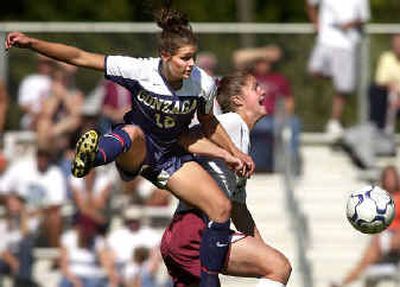Olympic opportunity

HERAKLION, Greece — For six days members of the Greek women’s soccer team – including Gonzaga University senior Walker Loseno – walked around the beach front hotel they shared with the U.S. squad on the island of Crete star struck.
“We were in awe (of the Americans),” said Loseno, a midfielder. “We’d see Mia and we’d go ‘That’s Mia, that’s Mia! Oh, my god!’ “
A group of Greek players were shopping for lotion at a local shop Tuesday when they turned around to find themselves face to face with one of their heroes.
“Mia was shopping for lotion just like us,” Greece goalkeeper Maria Giatrakis said. “That’s when we realized they do the same things we do.”
The only similarity evident in a 3-0 U.S. victory against Greece on Wednesday night in the opening match of the 2004 Olympic Games was the twin pursuits of a common dream.
“We just want to show people we can play this game,” Giatrakis said.
In a setting straight out of a travel brochure, the sun setting behind a shiny new stadium a corner kick away from the beach, the revolution launched by the Americans eight years ago in the other Athens continued to pick up momentum.
“They opened the door for so many other countries and we’re trying to ride on that wave,” Giatrakis said.
“The 1999 (Women’s) World Cup and the 1996 Olympics showed that when the world watches the way women play they get a new perspective on it,” U.S. captain Julie Foudy said.
Among those who had their eyes opening by the U.S. victories and record-setting success of both tournaments were the powers that be in the Greek Football Federation and the Greece Olympic Committee.
“In Greece team sports was not seen as something women could do,” Giatrakis said. “Especially soccer.”
Not wanting to be embarrassed as Olympic hosts, the Greeks committed themselves two years ago to building a top-class women’s program. Committing resources was one thing. Finding players was another.
So the GFF turned to the U.S. for help, putting that word out for American players of Greek heritage.
Giatrakis, a Brooklyn native and daughter of Greek-born father found out about the Greek effort from her coach at the University of Connecticut. Loseno, who grew up in Seattle, read about the team on a women’s soccer Web site.
“So I called the coach and she said I could come to a try out one week later,” said Loseno, whose great grandparents were born in Greece.
After 50 games over the past two years, eight Greek Americans, including seven starters, made the Greek Olympic team.
In the pre-Olympic build up there were relatively few language and cultural problems. Loseno didn’t have a Greek passport until she stopped off at the Greek embassy in New York on her way to the Olympics.
“We’re Greek,” said Loseno, who was named Walker by her parents after the photographer Walker Evans. But with her teammates she goes by Amalia, her baptismal name in the Greek Orthodox Church. “My Greek heritage has always been very important in my life. That’s what I grew up with.”
Solving the communications gap is not the same as closing the gap with the world’s best teams. Especially when your players idolize their opponents.
“On TV the Americans look like giants,” Greek coach Xanthis Konstantinidou said. “It was good for our players to see they’re normal players. That OK, sometimes we can play with them.” Wednesday night had enough moments to give the crowd of 15,757 to cheer about. Giatrakis prevented the score from being more lopsided.
No goalkeeper in the world, however, could have stopped the third U.S. goal, a classic from Hamm in the 82nd minute. Dribbling up the middle into the penalty area, Hamm hesitated to her right freezing one defender, cut back to her left, then curved a shot around two defenders that Giatrakis could only get the tips of her fingers on before it crashed off the far post into the goal. “Typical Mia,” U.S. midfielder Kristine Lilly said.
A half later Konstantinidou was wrapping up the post-match press conference with U.S. coach April Heinrichs when she asked Heinrichs to wait for a moment.
“I saw your team play in 1996 in front of 76,000 people,” Konstantinidou said. “That inspired me a lot, really. You inspired me and my players to be here. All of the women’s soccer world owes something to your team.”